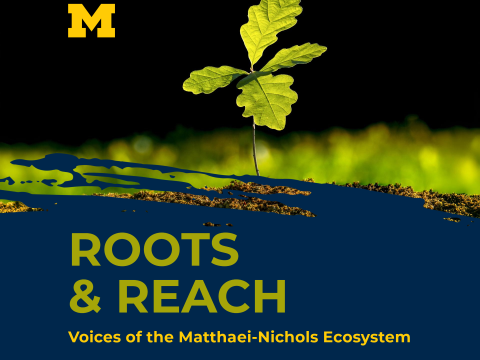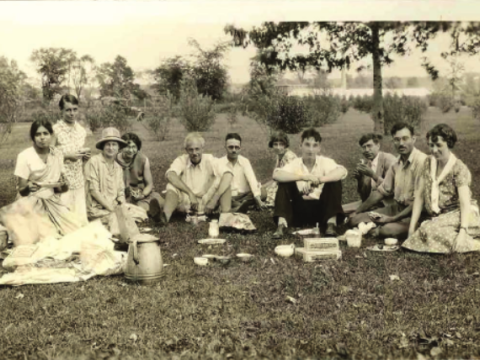A team sorts compostable materials from the UM football game
Pilot project cultivates sustainability and experiential learning
Compost from football games could be used to grow produce at the student-run Campus Farm, if a recent experiment goes well. This approach to managing the Michigan Stadium waste stream would capture valuable nutrients for the Campus Farm and provide experiential learning and research opportunities.
The Campus Farm at Matthaei Botanical Gardens is a living-learning lab where students engage in hands-on experiences through food grown by students for students. This pilot project builds on the Campus Farm’s mission by partnering with the zero waste program at Michigan Stadium, which recycles and composts more than 75% of the waste generated at home football games.
After the November 4, 2023 home football game, compostable waste was delivered to the Campus Farm at Matthaei Botanical Gardens rather than the usual offsite industrial composting facility. Contractors sorted out recyclable and landfill items. The compostable items were then mixed with leaves and other yard waste collected from campus by Grounds Services.
Experts with the Campus Farm will manage the compost creation process, including periodically turning the piles to aid decomposition.
In six to eight months, it will be apparent whether compostable materials from the stadium can be composted at the Campus Farm. If it’s successful, the resulting compost would be used by the Campus Farm to grow food that is consumed on campus.
“This is a perfect example of how the Campus Farm serves as a living-learning lab for sustainable food systems work on campus and a demonstration of the increased impact units can have working together,” said Jeremy Moghtader, Campus Farm Program Manager. “Any time we can advance the sustainability of our operations in a way that allows students to engage and learn from the process, while sharing that impact with the broader public, we are leaning into what it means to be a public university for the public good.”
The effort is a partnership between the Office of Campus Sustainability, Matthaei Botanical Gardens and Nichols Arboretum, Athletics, Facilities and Operations Grounds Services, and Facilities and Operations Waste Management Services.
“The idea was spurred by changing compost site standards and the desire for more options to manage the stadium compost stream,” said Anya Dale, Sustainable Systems and Waste Manager with the Office of Campus Sustainability. “I’m excited about the possibility of integrating campus compostable waste back into our operations in a visible way that creates opportunities for education and research.”
More than 525,000 people visit Matthaei Botanical Gardens and Nichols Arboretum each year, making it the most visited cultural organization at U-M. This presents an opportunity to develop an educational component for visitors to learn about composting and its benefits to the environment and society.
By:
Katrina Folsom, PMP - Office of Campus Sustainability
Kerry Sprague, MS - Matthaei Botanical Gardens and Nichols Arboretum


